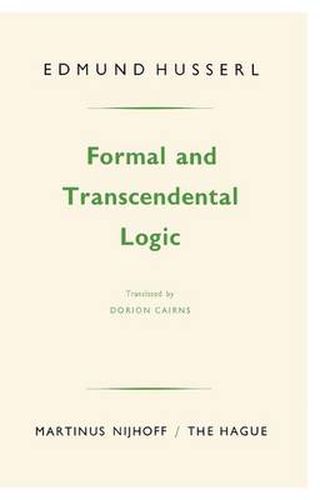Readings Newsletter
Become a Readings Member to make your shopping experience even easier.
Sign in or sign up for free!
You’re not far away from qualifying for FREE standard shipping within Australia
You’ve qualified for FREE standard shipping within Australia
The cart is loading…






This title is printed to order. This book may have been self-published. If so, we cannot guarantee the quality of the content. In the main most books will have gone through the editing process however some may not. We therefore suggest that you be aware of this before ordering this book. If in doubt check either the author or publisher’s details as we are unable to accept any returns unless they are faulty. Please contact us if you have any questions.
2 called in question, then naturally no fact, science, could be presupposed. Thus Plato was set on the path to the pure idea. Not gathered from the de facto sciences but formative of pure norms, his dialectic of pure ideas - as we say, his logic or his theory of science - was called on to make genuine 1 science possible now for the first time, to guide its practice. And precisely in fulfilling this vocation the Platonic dialectic actually helped create sciences in the pregnant sense, sciences that were consciously sustained by the idea of logical science and sought to actualize it so far as possible. Such were the strict mathematics and natural science whose further developments at higher stages are our modern sciences. But the original relationship between logic and science has undergone a remarkable reversal in modern times. The sciences made themselves independent. Without being able to satisfy completely the spirit of critical self-justification, they fashioned extremely differentiated methods, whose fruitfulness, it is true, was practically certain, but whose productivity was not clarified by ultimate insight. They fashioned these methods, not indeed with the everyday man’s naivete, but still with a naivete of a higher level, which abandoned the appeal to the pure idea, the justifying of method by pure principles, according to ultimate apriori possibilities and necessities.
$9.00 standard shipping within Australia
FREE standard shipping within Australia for orders over $100.00
Express & International shipping calculated at checkout
This title is printed to order. This book may have been self-published. If so, we cannot guarantee the quality of the content. In the main most books will have gone through the editing process however some may not. We therefore suggest that you be aware of this before ordering this book. If in doubt check either the author or publisher’s details as we are unable to accept any returns unless they are faulty. Please contact us if you have any questions.
2 called in question, then naturally no fact, science, could be presupposed. Thus Plato was set on the path to the pure idea. Not gathered from the de facto sciences but formative of pure norms, his dialectic of pure ideas - as we say, his logic or his theory of science - was called on to make genuine 1 science possible now for the first time, to guide its practice. And precisely in fulfilling this vocation the Platonic dialectic actually helped create sciences in the pregnant sense, sciences that were consciously sustained by the idea of logical science and sought to actualize it so far as possible. Such were the strict mathematics and natural science whose further developments at higher stages are our modern sciences. But the original relationship between logic and science has undergone a remarkable reversal in modern times. The sciences made themselves independent. Without being able to satisfy completely the spirit of critical self-justification, they fashioned extremely differentiated methods, whose fruitfulness, it is true, was practically certain, but whose productivity was not clarified by ultimate insight. They fashioned these methods, not indeed with the everyday man’s naivete, but still with a naivete of a higher level, which abandoned the appeal to the pure idea, the justifying of method by pure principles, according to ultimate apriori possibilities and necessities.